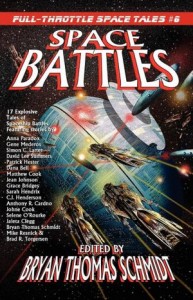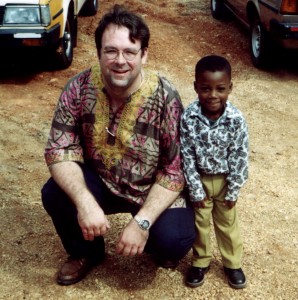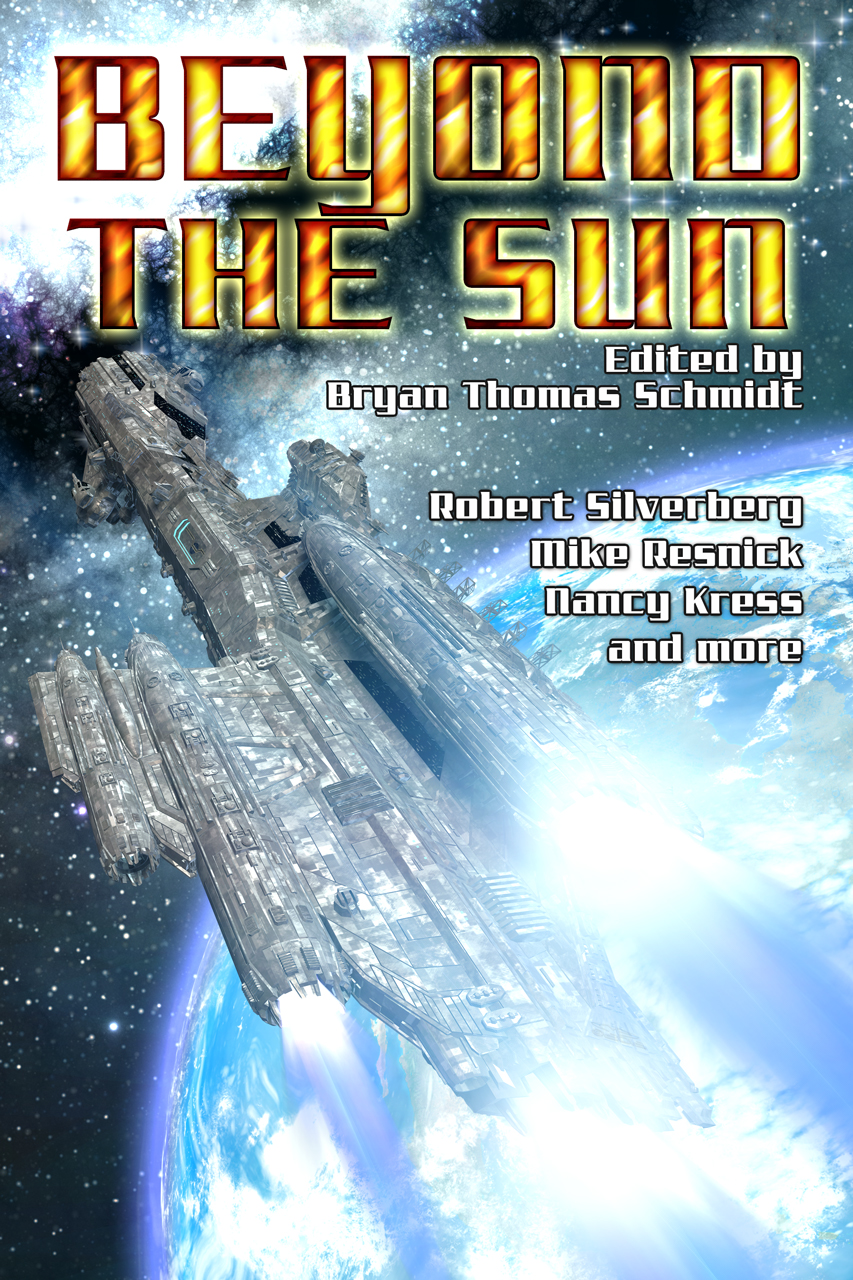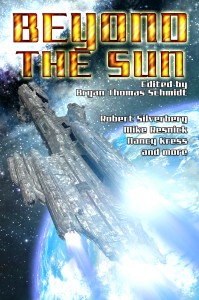 Author/Editor Launches Kickstarter For Dream Anthology
Author/Editor Launches Kickstarter For Dream Anthology
Kansas Author-editor Bryan Thomas Schmidt, whose debut novel, The Worker Prince, merited Honorable Mention from Barnes & Noble Book Club’s on their Year’s Best Science Fiction Releases of 2011, had a dream.
“Ever since I was a child, I’ve dreamed about exploring the stars. What’s out there? What strange planets and beings might we encounter?” Schmidt said. As he watched NASA’s budget downsized and space travel, at least in the United States, get turned over to private enterprise, he recalled sitting on his grandmother’s lap as a child and looking at scrapbooks she’d kept of all the NASA clippings. “We used to dream together, to imagine. It fascinated both of us, and it was so fun to just speculate about what it might all mean or bring about.”
Space colonization has been a popular topic for science fiction writers. From Orson Scott Card’s Enderand Shadow series to Frank Herbert’s Dune and more, authors have written millions of words imagining the possibilities. Kim Stanley Robinson (Mars series), Allan Steele (Coyote series), Robert Silverberg (Majipoorseries), Mike Resnick (Kirinyaga and Chronicles Of A Distant World series), and many more novels and stories have been inspired by the subject.
“I love the ideas people come up with, and I wanted a chance to fill the need left by NASA’s downsizing to inspire that sense of wonder in future and present generations,” Schmidt said.
Such was the inspiration for his anthology project Beyond The Sun. “Beyond The Sun is going to feature stories by some amazing legendary science fiction writers, some established writers and some new writers on the subject,” he says. His headliners are all Hugo and Nebula winners: Robert Silverberg, Kristine Kathryn Rusch, Mike Resnick and Nancy Kress. All have written novels and stories on the topic before and look forward to exploring it further. Joining them are familiar names such as Cat Rambo, Jason Sanford, Jennifer Brozek, Brad R. Torgersen, Jean Johnson, Erin Hoffman, Jamie Todd Rubin and Guy Anthony DeMarco.
“The writers included are some of my writing heroes and good friends,” Schmidt says. “It’s a thrill to have the participation of such notables as well as giving new writers the opportunity get more exposure for their own work by appearing alongside others with such respected reputations. Plus, you can just tell from the list of names how amazing the anthology is going to be!”
Just between them, the four headliners have 12 Hugo Awards, 5 Nebulas and a slew of other awards. Several other invitees have nominations and awards as well. Schmidt has even lined up  award-winning artist Mitchell Davidson Bentley to do the cover as well as several experienced and up and coming artists to add images for the stories themselves. “It’s rare these days to have artwork inside books, but I think it inspires the imagination,” Schmidt says. “I know that, as a writer, it’s intriguing to see what artists get as inspiration from my own work.” With the project aimed at being family friendly and applicable for educational use, Schmidt also thinks this will add value and interest.
award-winning artist Mitchell Davidson Bentley to do the cover as well as several experienced and up and coming artists to add images for the stories themselves. “It’s rare these days to have artwork inside books, but I think it inspires the imagination,” Schmidt says. “I know that, as a writer, it’s intriguing to see what artists get as inspiration from my own work.” With the project aimed at being family friendly and applicable for educational use, Schmidt also thinks this will add value and interest.
“What better way to get future generations not only reading but excited about science and science fiction than by creating something teachers can use as a resource to stimulate dialogue, discussion, and imagination?” Schmidt explains. “I would have loved to get to read something like this for class as a kid. And I hear from teachers and parents how much they wish they had more quality stories with age appropriate content they could share with their kids.”
Schmidt’s previous anthology as editor, Space Battles: Full Throttle Space Tales 6, which also featured stories by several authors involved with Beyond The Sun, including a headline story by Mike Resnick & Brad R. Torgersen, has garnered positive reviews and steady sales. Schmidt says, “That publisher has been very supportive, but most small presses struggle to find the money to pay writers pro-rates for stories. On top of that to pay artists and editors. With the Kickstarter, we can package those costs in advance and allow the publisher to put their resources into producing a really good quality, edited, copyedited and laid out final product. Several small presses have already expressed interest. But the project has to happen first.”
If all goes well, Beyond The Sun will be released in late Spring 2013 and available at all major online retailers as well as local bookstores. A number of great incentives from signed art to signed books and even personalized thanks yous and tuckerized names are available to backers via the Kickstarter.
“Mostly I’m doing this because I love the concept and I love helping and working with other writers,” Schmidt says. “What better way than to offer them a great concept and good pay to do what they love?”
 Slated to include 20 stories, only 3 of which would be reprints, backing Beyond The Sun is possible through October 17th at the project’s Kickstarter Page, which includes a project video and regular updates. A native of Salina, current resident of Ottawa, and former resident of Kansas City and Olathe, Schmidt is an active convention speaker and instructor. He has had four books published in print and several in ebook as well as short stories featured in magazines and online, all in the last two years. A freelance editor, he regularly edits books and stories for small presses and authors. He also is a regular contributor to blogs at Hugo winning www.sfsignal.com, www.adventuresinsfpublishing.com, www.tobereadbooks.com and www.graspingforthewind.com as well as running his own blog and hosting the live Twitter interview series SFFWRTCHT (Science Fiction and Fantasy Writer’s Chat) Wednesdays at 9 p.m. ET. More information can be found on Schmidt’s blog here. And you can also find him onFacebook or follow him on Twitter. He can be contacted at 314-781-9120.
Slated to include 20 stories, only 3 of which would be reprints, backing Beyond The Sun is possible through October 17th at the project’s Kickstarter Page, which includes a project video and regular updates. A native of Salina, current resident of Ottawa, and former resident of Kansas City and Olathe, Schmidt is an active convention speaker and instructor. He has had four books published in print and several in ebook as well as short stories featured in magazines and online, all in the last two years. A freelance editor, he regularly edits books and stories for small presses and authors. He also is a regular contributor to blogs at Hugo winning www.sfsignal.com, www.adventuresinsfpublishing.com, www.tobereadbooks.com and www.graspingforthewind.com as well as running his own blog and hosting the live Twitter interview series SFFWRTCHT (Science Fiction and Fantasy Writer’s Chat) Wednesdays at 9 p.m. ET. More information can be found on Schmidt’s blog here. And you can also find him onFacebook or follow him on Twitter. He can be contacted at 314-781-9120.
The Project’s page can be found on Kickstarter here: http://www.kickstarter.com/projects/601968027/beyond-the-sun-anthology and is regularly updated.





